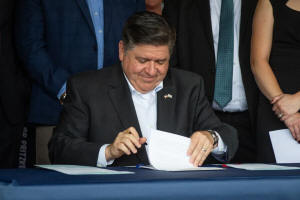Pritzker directs agencies to limit spending in response to Trump’s
economic policies
[September 24, 2025]
By Ben Szalinski
Illinois agencies must identify spending reductions and create reserves
in their budgets to prepare for an economic downturn, according to an
executive order issued Tuesday by Gov. JB Pritzker.
Pritzker said the order is designed to combat federal policies by the
Trump administration that are likely to increase costs on the state and
put pressure on the economy. The latest order requires most state
agencies to, within 30 days, “identify immediate spending reductions,
including efficiencies that will result in reduced spending.”
Pritzker also directed the agencies to reserve 4% of fiscal year 2026
general fund appropriations. Lawmakers approved a $55.1 billion spending
plan, meaning the order could halt up to $2.2 billion in approved
spending in anticipation of state revenue declining.
Some state agencies, such as the State Board of Education and the
state’s pension systems, are not subject to the order to identify
spending cuts.
Pritzker also ordered agencies that find budget shortfalls to identify
lines in their budgets that can be reduced. The order also directed
agencies to pause nonessential purchases and travel.
“It’s a beginning of dealing with what we think could be a very severe
challenge for the state budget this year,” Pritzker told reporters in
Joliet. “Remember, we can only identify what we know. Here’s something
that I’m very concerned about, which is that the budget is affected
vastly by the economic situation of the country, and we’re already
seeing that states like Iowa are in recession.”

General Assembly Republicans voted against the budget, and House
Minority Leader Tony McCombie, R-Savanna, said her party was sounding
the alarm about pressure on the state budget before President Donald
Trump’s second term.
“We warned that this budget was irresponsible and overspent,” she said
in a statement. “Stop passing blame, Governor. Illinoisans aren’t buying
that recent policy changes in Washington, D.C., are to blame for the
decades of Illinois financial mismanagement.”
Trump-driven fears
Pritzker said Trump’s policies are driving fears about declining
revenues.
Pritzker noted the “One Big Beautiful Bill Act,” signed by Trump in
July, is at the top of the list because it passes costs for several
federal programs down to the states.
Congress, for example, required states to pay a greater portion of
administrative and benefits costs for the Supplemental Nutrition
Assistance Program. Congress also tightened access to other programs,
such as Medicaid, meaning it will be up to states to close funding gaps
to allow many people to stay on the program.
The bill also extended tax cuts for businesses and wealthy Americans.
The order said much of Illinois’ tax code is tied to the federal tax
code and Illinois will see revenue decline because of these tax cuts at
the federal level.
The executive order also said tariffs will hurt consumer spending by
increasing costs.
[to top of second column]
|

Gov. JB Pritzker sings a bill at the Illinois AFL-CIO in Springfield
on Thursday, Aug. 14, 2025. (Capitol News Illinois photo by Jerry
Nowicki)

“There are hundreds of millions of dollars that are going to have to be
made up for as a result of the cuts the federal government is making,
including in health care and nutritional assistance, but also across the
economy, with the tariffs that are impacting businesses in Illinois,”
Pritzker said. “So we think this is a prudent endeavor.”
Legislative Democrats anticipated that federal policies would affect
state coffers and established a $100 million BRIDGE fund — short for
Budget Reserve for Immediate Disbursements and Governmental Emergencies
— with money swept from 57 different funds. Pritzker can tap into that
fund “in the event of unanticipated delays in or failures of revenues.”
The state agencies will report their 4% spending reserves and reductions
to the governor’s office the same week some agencies must also report on
the effects of tariffs.
Pritzker signed another executive order in July that requires seven
state agencies to “consider the specific impacts that the U.S. tariffs
have had on Illinois and provide draft recommendations of measures to
mitigate the impact of these tariffs.”
Economic indicators
Recent economic reports have suggested the economy is struggling. The
August jobs report by the Bureau of Labor Statistics found the U.S.
added just 22,000 jobs in August and lost 13,000 in June.
Illinois struggled even more in August with the Illinois Department of
Employment Security’s preliminary report on job growth showing the state
lost 13,300 non-farm jobs last month.
The General Assembly’s independent Commission on Government Forecasting
and Accountability reported in early September the state has added just
4,600 jobs on a seasonally adjusted basis since December. Unemployment
in Illinois declined to 4.4% in August — continuing a yearlong trend —
but COGFA’s report said that’s because the state’s labor force has been
shrinking because of “demographic trends” and lower immigration rates.

The state’s general revenues were $37 million higher through the first
two months of the fiscal year compared to last year, according to COGFA,
but that’s largely thanks to transfer from another state fund. Personal
income tax receipts are down 1% and corporate income tax receipts are
down 21% so far this year.
Capitol News Illinois is
a nonprofit, nonpartisan news service that distributes state government
coverage to hundreds of news outlets statewide. It is funded primarily
by the Illinois Press Foundation and the Robert R. McCormick Foundation. |